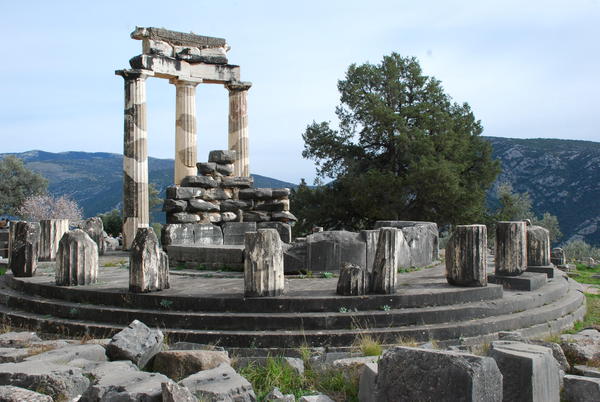The inscription carved on the grand arch entrance in Delphi reads: “Know thyself.” Although it’s as relevant today as in the 8th century B.C., you might wonder how well it was heeded within the gates of ancient Greece.

For centuries, pilgrims-common men and women, as well as generals and kings-flocked to the Oracle of Delphi to ask their most important life questions. And, legend has it, her predictions came true.
Although you can’t see, touch, or hear the Oracle, you’ll sense the mysticism filling the air as the urban sprawl of Athens, 100 miles in the distance, dissolves into the rugged terrain. Nestled on the slopes of Mount Parnassus, you’ll find sprawling archaeological ruins in the valley of Phocis. Its magnificent location boasts panoramic vistas eliciting an intangible magic matched only by the centerpiece of the site, the Temple of Apollo, home to the Oracle herself.
 Follow in the footsteps of thousands who traveled here, climbing the hot and dusty trail towards the Temple. See what’s left of the market, theatre, and stadium clinging to the mountainside. Think of the pilgrims scouring the market for an offering—perhaps as encouragement for an answer, perhaps simply as gratitude. And as you approach the Temple, try to see past its shattered bones to envision an edifice that once stood so awesome that it evoked unquestioning faith from all who entered. Replicas of its former structure are not hard to find in town, but you can get a full picture of the archaeological site in the Delphi Museum.
Follow in the footsteps of thousands who traveled here, climbing the hot and dusty trail towards the Temple. See what’s left of the market, theatre, and stadium clinging to the mountainside. Think of the pilgrims scouring the market for an offering—perhaps as encouragement for an answer, perhaps simply as gratitude. And as you approach the Temple, try to see past its shattered bones to envision an edifice that once stood so awesome that it evoked unquestioning faith from all who entered. Replicas of its former structure are not hard to find in town, but you can get a full picture of the archaeological site in the Delphi Museum.
Do you really need to see to believe? Although not visible today, pilgrims reported vapours wafting from a rock’s fissure deep inside the Temple. Ancients believed it was this mist that empowered Priestess Pythia to convey the Oracle’s messages. Imagine her haunting screams as she worked, arousing an audience that, until then, had waited in tense, silent anticipation.
 If you’re wondering whether there’s any truth to the legend, consider the story of Croesus, King of Lydia, who in 547 B.C. asked the Oracle if he should attack the Persians. The Oracle responded, “If you do, you’ll cause a great Empire to fall.” Encouraged, the king launched his attack, only to find himself defeated. Distraught, the king went back to the Oracle to complain. “I told you an Empire would fall,” she said. “It just happens to be yours!”
If you’re wondering whether there’s any truth to the legend, consider the story of Croesus, King of Lydia, who in 547 B.C. asked the Oracle if he should attack the Persians. The Oracle responded, “If you do, you’ll cause a great Empire to fall.” Encouraged, the king launched his attack, only to find himself defeated. Distraught, the king went back to the Oracle to complain. “I told you an Empire would fall,” she said. “It just happens to be yours!”
The moral of the story? Don’t confuse what you hear with what you want to hear. After all, eternal wisdom at Delphi preaches know thyself… suggesting that some answers are meant to come only from within.
Explore our most popular tour that includes this activity: explorica.com/iag

